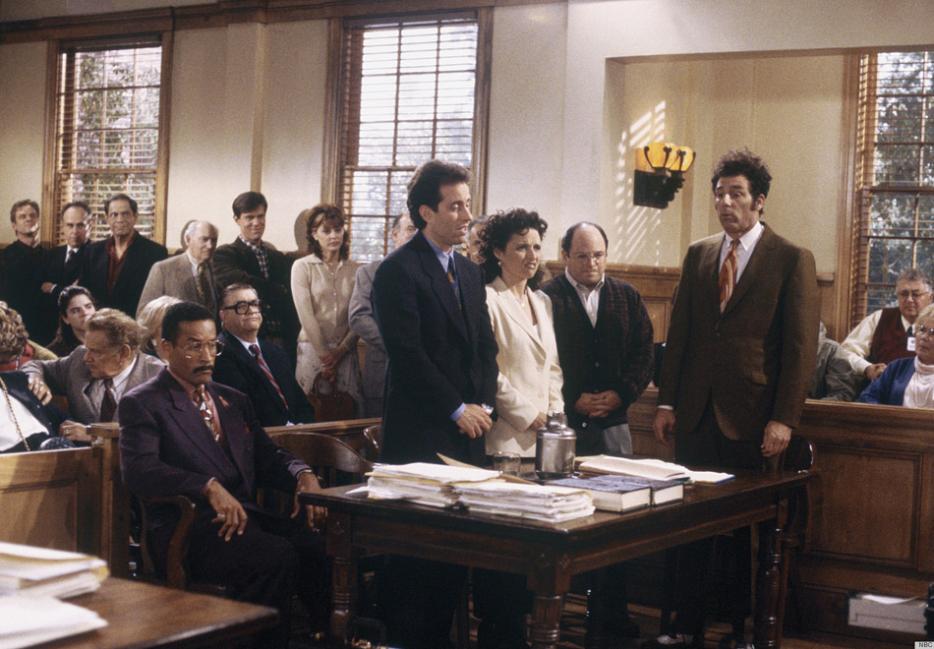Elaine, Jerry, George, and Kramer are lost in a shopping mall parking garage. Elaine has a goldfish in a bag, George is late for his parents’ anniversary dinner, and none of them can remember where they left Kramer’s car. When Jerry goes off to pee and gets arrested by a security guard, it sparks a chain reaction of Seinfeld lost-and-found:
GEORGE: Unbelievable, I'm never gonna get out of here. The guy goes to pee, he never comes back. It's like a science fiction story.
ELAINE: Maybe he went to one of the other levels. I'll go look for him.
GEORGE: Oh now you're gonna go?
ELAINE: I'll be back in five minutes.
GEORGE: If you go now, I know what's gonna happen. We'll find the car, Jerry will show up, and then we'll never find you.
ELAINE: No, no, I'll be back. She leaves.
GEORGE: Oh what's the difference? We'll all be dead eventually.
In his new book Poking a Dead Frog: Conversations with Today’s Top Comedy Writers, Mike Sacks interviews Peter Mehlman, one of the writers from Seinfeld’s heyday. Sacks asks whether cellphones and other new technologies would have made Seinfeld a harder show to write. “If written now, there would be a million instances of one character being able to call another character and saying, ‘Don’t do that!’” Mehlman says. “When you think about it, convenience doesn’t make for good comedy.”
Trying to track someone down? Pass along crucial information before it’s too late? No need to go on a journey where hi-jinx, hilarity, or serendipitous encounters might ensue. Cellphones allow characters to keep one foot outside the boundaries of any physical space, and for situational comedies—as well as novels, plays, movies, and any other form of narrative storytelling—this unsituatedness makes some classic plot lines impossible. In a 2012 interview with the Paris Review, Brett Easton Ellis said of his first book, “Incidentally, someone recently noted that if Less Than Zero were written now it would be about twenty pages long because of cell phones and texting...A single text—‘Dude, where the fuck are you? I want my money’—would take care of three-fourths of the action in the book.”
But while pundits used to argue that cellphones have killed the sitcom, it’s more accurate to say that cellphones, as well as Facebook, Twitter, and Google, have instead redrawn the territory of dramatic irony: if a pre-Millennium sitcom was ruled by the scarcity of information, today’s sitcoms take place in a context of too much.
There’s an episode from the seventh season of How I Met Your Mother in which perpetually single Ted meets a woman named Janet Macintyre at a bar and they agree to go on a date without—gasp—googling each other first. Googling Ted’s dates, as a flashback sequence shows, is par for the course.
“Paula Vincenzo,” Ted, in the bar, says on his phone. “She’s in the bathroom. What’s wrong with her?” Robin and Barney, his self-appointed crack investigative team, are in Ted’s apartment wearing headsets. “Total psycho,” Robin says, snapping her gum. Paula Vincenzo’s Facebook wall has revealed that she spent last year engaged—to a mini-fridge. “And there’s pictures,” Barney adds. “Her and the mini-fridge on a hike. Her and the mini-fridge in wine country. Here’s the mini-fridge meeting her parents.” “Run like the wind,” Robin says.
“Incidentally, someone recently noted that if Less Than Zero were written now it would be about twenty pages long because of cell phones and texting...A single text—‘Dude, where the fuck are you? I want my money’—would take care of three-fourths of the action in the book.”
On the date with Janet, Ted is having a great time until he looks at his phone. His friends have sent him a link and are insisting that he click on it. Worried that there must be something seriously wrong with his date, Ted clicks—and finds out the problem with Janet Macintyre is that she’s too amazing. Online research has revealed that she graduated from Princeton at 15, was the youngest woman to scale Everest, saved a baby from a raging creek, etc, etc. When Janet comes back from the bathroom, Ted’s tongue-tied state immediately gives it away that he has googled her. “We had one promise, and you broke it,” she says, before storming out.
Now that characters can always find each other, it throws into high relief the existential question of whether we can truly reach each other. In a 2011 New York Times article on the sitcom Modern Family, writer Abraham Higginbotham told Bruce Feiler, “We used to talk about how cellphones killed the sitcom because no one ever goes to anyone’s house anymore.” On this show, however, Feiler writes, the technology of a modern household is integral to how the families interact. “[C]haracters in 'Modern Family' are so immersed in technology that nearly every scene is refracted through a digital funhouse: an iPad screen, a cellphone camera, a baby monitor, a YouTube video. Characters spend half their time glancing past one another rather than communicating directly.”
If cellphones can now do away with everything that separates us, why do we still feel so disconnected? It’s like being single and lonely, then finally finding a loving partner—and still feeling lonely. The human condition as posited in the modern era—essentially, a socially awkward odyssey through a landscape of meaningless coincidences governed by no power higher than social network producers—may be so ridiculously bleak that even being connected to one another 24/7 can only make our neurotic isolation more evident. The social gaps between us can’t be filled in by information.
Instead, they’re filled by the same things they were in the ’90s—insecurity, selfishness, fear, and illusion. We’re still not certain whether other people really like us, and there’s still no way to find out for sure. In the very first episode of Seinfeld, Jerry and George spend half the show picking apart a phone call that Jerry received from a woman he’s interested in—does she just want to be his friend? Is she asking to stay with him because she intends to sleep with him, or because it’s cheaper than a hotel? If this episode took place in the present day, George and Jerry would be poring over a text she sent and scouring her Facebook page for signs of a relationship. But it would still be hard to tell—is the attractive man standing with her in an exotic location her cousin? If her text says, “Looking forward!!,” are the two exclamation marks a sign? What is the signal??
The highly performative awkwardness of TV is now on display in our real lives. Now that our insecurities, idiosyncrasies, and mistakes are all on Facebook along with what kind of cereal we had for breakfast, we are not only Friends but Friends—roommates constantly commenting on the minutiae of each other’s days. In many ways, nothing has changed: our in-jokes are now out where everyone can see them, but we’ll all still be dead eventually.
Every week, Linda Besner reads a new book and writes on a tangentially related topic.






